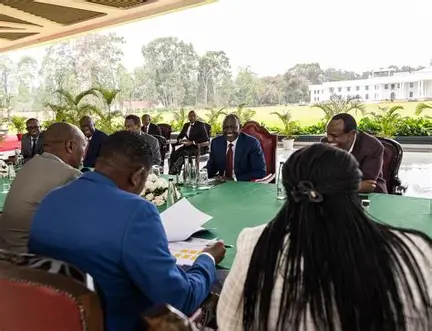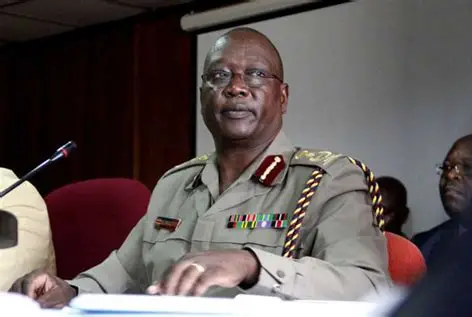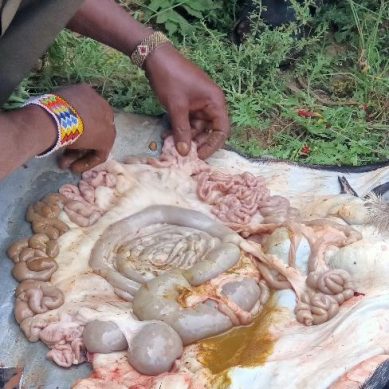
As Kenyan youth engaged the police and President William Ruto’s government in running battles, the country’s political class was is mourning former cabinet minister James Maina Wanjigi, who died on June 28, in Nairobi.
Wanjigi leaves behind indelible footprints on land ownership and human resettlement that are often flashpoints in Kenyan politics with devastating results.
The death of former assistant minister agriculture coincided with another historical moment in Kenya as the youth sought to control their in a country they complain they are reduced to bystanders. This flows decades of grumbling over opulence in government, corruption, economic neglect and a cunning executive that is plotting to overload them with punitive taxes as employment hopes fade.
The youth movement that shaken the political establishment bears a semblance of the fight for political pluralism of the late 1980s that Wanjigi was a part of after giving then ruling party Kanu a wide berth. The movement ushered in multipartyism, the 2010 constitution and kept World Bank and International Monetary Fund (IMF) at bay for a while until recently when Kenya returned to its old bad habits of unnecessary borrowing and ravenous theft of the same loaned funds.
The fallen politician is the father of Nairobi businessman and political activist Jimi Wanjigi.
Veteran journalist and former editor of the Sunday Post Salim Lone remembers Maina Wanjigi as politicians who spoke his mind openly and was never afraid of the consequences.
In a tribute, Lone says, “I first met Mzee Wanjigi at the home of Dr Johnstone Muthiora on the day he died (or was perhaps killed?) in 1974. Mzee was there with his close ally Kenneth Matiba, and they stunned me with their candour/anger about Kenya. That made me realise that even some very senior and successful ministers were not comfortable with the direction Kenya had taken.
“I was then the editor of the Sunday Post and the two spoke freely to me as they knew my paper was critical of some key government policies, and had supported their ally Dr Muthiora in his eventually successful 1974 election campaign to defeat Dr Njoroge Mungai, the Dagoretti MP considered by many to be the likely successor to President Jomo Kenyatta. Among others opposing Dr Mungai were Mr Charles Njonjo and Daily Nation Editor-in-Chief George Githii.”
Wanjigi’s political star began to shine brightly when Tom Mboya’s dimmed in 1969. Mboya was assassinated by Jomo Kenyatta’s government, which in part explains why it was suspected Muthiora’s life was ended in the same manner. Jomo Kenyatta did not brook opposition to his leadership.
When Lone met Wanjigi was at Muthiora’s home for the first time, he was with his close ally Kenneth Matiba, “and they stunned me with their candour and anger about Kenya. That made me realise that even some very senior and successful ministers were not comfortable with the direction Kenya had taken.”
The defeat scuttled Dr Mungai’s political career, which ultimately saw Kenyatta’s vice president Daniel arap Moi become president, whom many preferred, recalls Lone.
“They thought Moi would be better for Kenyans as he did not belong to a rich, privileged group controlling political power and vast amounts of wealth. Dr Mungai certainly did (having been Jomo Kenyatta’s personal physician), and many feared he and his group (centred around Mt Kenya) would want to protect and enlarge their gains – many illicitly acquired,” says Lone in message to Tell Media.
As it eventually turned out, President Moi and his cohorts became fabulously wealthy and led Kenya astray.
Lone recalls further, “After that first meeting, I became a big fan and a close friend of Mzee Wanjigi. His humility, honesty and commitment to uplifting Kenyans and his refusal to accumulate vast wealth, made him a very loveable person.”
In another tribute to the fallen politician, the Standard newspaper observed, “Wanjigi went on to become an influential public servant in post-independent Kenya because of the pivotal role he played in the resettlement of natives on farms that previously belonged to colonial white settlers. Thousands of local people, mostly from Kiambu, were settled in the Central and North Rift Valley.
During the independence negotiations at Lancaster, it was agreed that the British government would loan Kenya £26 million – which Wanjigi controlled at the time – for resettlement of local people, mainly the Kikuyu.
Wanjigi used the money to pay off white settlers who volunteered to leave the country, especially those in the North Rift were resettled in South Africa.
His family says Wanjigi studied at Kagumo in Nyeri and Alliance schools and proceeded to Makerere University in Uganda, then to the US where he earned a master’s degree in economics before Kenya’s independence in 1963.
He was thereafter employed by the colonial government as an assistant agricultural extension officer in Nyeri district (now Nyeri County) and in the process became director of settlements. He retained the position of director of settlements in the post-independence government under Jomo Kenyatta. He elicited resentment from locals in the manner he executed his mandate but had the backing of the president.
According to the Standard, “The resettlement exercise, however, created a lot of discontent and controversy, especially from some Mau Mau freedom fighters who claimed they were never given land despite the role they played in the struggle for independence. But satisfied that he had done a good job, President Jomo Kenyatta appointed him chief executive of the Industrial and Commercial Development Corporation (ICDC) in 1968, ostensibly to now empower the commercial capacity of local communities.”
After he joined politics upon the death Tom Mboya, Kenyatta appointed him assistant minister for agriculture, which made him one of the most influential politicians who never served in a full ministerial capacity before the first president’s death in 1978.
As Kamukunji MP, he helped small-scale and petty traders start the Gikomba Market and the Shauri Moyo craftspeople yards that have evolved into key subsectors of the national economy as they have been replicated in other major towns.
His involvement in politics exposed him to the realities of how poverty was a barrier to quality education. Children in the low-income backgrounds could not access basic education and in an address to parliament in June 1973, Wanjigi advocated for free primary education in Kenya.
Accoordint to the Hansard, Wanjigi told parliament, “Unless you have a good education to which every child has access and that can be harnessed to (enable them to) reach their full potential, you cannot build a sound population and a sound nation. It is about time somebody got the message that we want free primary education. Let every child in this country be entitled to at least eight years of free primary education.”
Wanjigi’s star continued to shine during Moi’s tenure that began in August 1978 because of the support he (Moi) had received from the MP during the succession campaign that saw many senior politicians purged from government.
He was appointed chairman of the national carrier Kenya Airways Board in 1979, a position that Wanjigi and later Isaac Omoro Okero used to turn the airline into a profitable venture when they were at the helm.
However, as it also happens, good times do not last forever. He fell out with Moi and joined emerging forces that were agitating for multiparty politics. Made up of Martin Shikuku, Masinde Muliro, James Orengo, George Anyona, Kenneth Matiba, and Oginga Odinga, among others
- A Tell report






